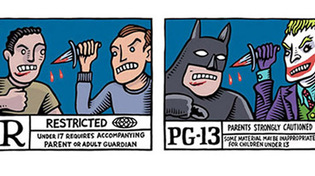 loading
loading
FindingsPG or not PG? Gregory NemecView full imageTitanic had almost everything: bare breasts, a steamy backseat sex scene, fistfights, curse words, gunshots, and of course, drowning—lots of drowning. But despite all of its adult content, James Cameron’s three-hour opus was rated PG-13. New research by Olav Sorenson, a professor at the School of Management, helps explain why. In a study to be published in the journal Organization Science, Sorenson found that films by big-name directors, such as Cameron, and distributed by big studios receive more-lenient ratings than movies produced by independent filmmakers. He and a coauthor examined 2,404 movies evaluated by the website Kids-In-Mind.com, which provides nuanced information about movies’ content and assigns the movies numerical scores. They found that big-studio movies on the borderline between PG-13 and R were 26 percent less likely to receive an R. Why does it matter? Money. On average, a PG-13 film pulls in 76 percent more money than an R movie. “We know that sex and violence sell,” Sorenson says. “But an R rating keeps children out of the theater, and children account for one-third of moviegoers. The game is to put the most explicit stuff in the film but not trigger an R rating. Big studios can do that.” Indeed, Titanic is the second-highest-grossing film of all time. Movies are rated by a team of eight parents working for the Motion Picture Association of America. The MPAA says they have no previous affiliation with the film industry and are tasked with rating movies the way “a majority of American parents” would. Sorenson speculates that the raters might view big-name films more favorably either because they’re star-struck or because they feel pressure to deliver better ratings to famous players. He points out that Lost in Translation, an indie love story about an aging actor and another man’s young wife, was rated R, while Must Love Dogs, a comedy about a teacher’s dating mishaps, was rated PG-13. In Sorenson’s view, both were equally risqué. But Must Love Dogs was distributed by Warner Brothers. Which, in the movie business, can be the difference between sink or swim.
The comment period has expired.
|
|